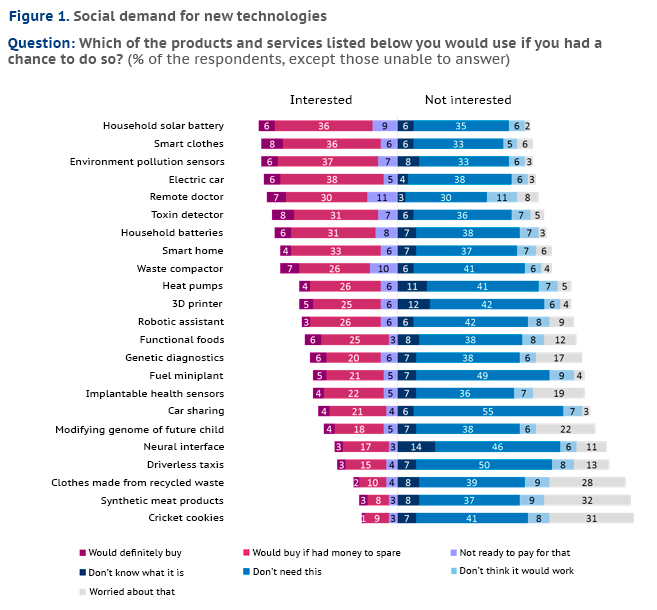Social Demand for New Technologies
Russians turn out to be rather conservative in their perception of new technologies, innovative products and services, and willingness to use. That was discovered in the course of a survey conducted by the ISSEK experts in the scope of the Monitoring Innovative Behaviour of the Population study (2015-2016). The results are presented in the current issue of the Science, Technology and Innovation newsletter.
It includes data collected during the ongoing Monitoring Innovative Behaviour of the Population study in the framework of the HSE Basic Research Programme 2015-2016.
Only a proportion of innovative products turn into commonly used ones. Quite frequently they find no demand among potential users. This may be due to a number of reasons including specific and varied ideas about what is “useful”, potential risks, or stereotypes associated with particular technologies. A good example is the situation with genetically modified products which, as international studies reveal, inspire mistrust and therefore command only a low demand by a significant proportion of the society. A logical step would be finding out the Russian population’s priorities regarding technological innovations. The data collected in the scope of the latest round of the Monitoring Innovative Behaviour of the Population study conducted by the HSE Institute for Statistical Studies and Economics of Knowledge allows to measure the people’s preferences for various specific technologies (Figure 1).

The Russians’ demand for new technologies was measured on the basis of a mass survey results1 during which the respondents were asked a number of questions regarding their willingness to use various innovative high-tech products. The list of such products included in the questionnaire was composed on the basis of the Russian S&T Foresight 2030 (approved by the Russian Prime Minister order of 03.01.2014 №DM-P8-5). It was broken down into seven areas: information and communication technologies, biotechnologies, medicine and health, new materials and nanotechnologies, efficient environmental management, transport and space systems, energy efficiency and energy saving. Several products and services suitable for everyday use were included in each group.
The survey results revealed that Russians had relatively low demand for new technologies: none of the suggested technological solutions looked interesting to more than a half of the respondents. To compare, similar surveys conducted in 2008 and 2010 showed a much higher interest in new high-tech products (on average, about two thirds of the respondents were willing to use several such products).
The Russians showed the highest interest in such technologies as roof-mounted household solar batteries (51%), smart clothes adjusting their properties to match the weather (50%), and household environment pollution sensors providing a warning about harmful substances in the air or in the water (50%). Interesting things were discovered concerning socio-demographic characteristics of such technologies’ potential users2. E.g. the respondents who were very positive about the overall role of science in modern society, and those who hold the opposite opinion, displayed a significant interest in solar batteries. On the contrary, only the “adepts of science” whose belief that all scientific research is beneficial was unwavering, were among potential users of smart clothes.
In turn, the Russians were least interested in using green technologies such as clothes made of recycled waste (16%), synthetic meat products (14%), and nutritious cookies made of ground crickets (13%). The main reasons for low demand for such products were insufficient awareness of benefits associated with their everyday use, and feelings of worry and alarm they inspire. Similar fears were voiced regarding medical innovations (modifying the genome of future child — 22%, implantable health sensors — 19%, genetic diagnostics — 17%). The most “useless” innovations according to the respondents were innovative urban transport technologies (car sharing — 55%, and driverless taxis — 50%), and the efficient environmental management solution “biofuel miniplant” (49%). Almost a half of the surveyed explained their unwillingness to use them by having no need for them at all.
On the whole, the collected data shows that even when there is a certain interest in the presented technologies, none of them can be described as being in steady demand in Russia. Technologies’ expected “usefulness” doesn’t always guarantee their acceptance by the population either. Many promising solutions get rejected due to lack of disposable income, and occasionally because of ethical considerations.
1 — Using a representative sample of the Russian population comprising 1,671 people aged 16 and older
2 — Calculated using the chi-square criterion
By Yury Voynilov and Konstantin Fursov
Yury Voynilov
Expert
Konstantin Fursov
Senior Research Fellow

